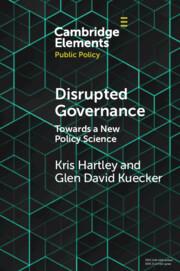Element contents
Disrupted Governance
Published online by Cambridge University Press: 16 February 2022
Summary
Information
- Type
- Element
- Information
- Series: Elements in Public PolicyOnline ISBN: 9781009127868Publisher: Cambridge University PressPrint publication: 17 March 2022
References
Accessibility standard: Unknown
Why this information is here
This section outlines the accessibility features of this content - including support for screen readers, full keyboard navigation and high-contrast display options. This may not be relevant for you.Accessibility Information
- 8
- Cited by
